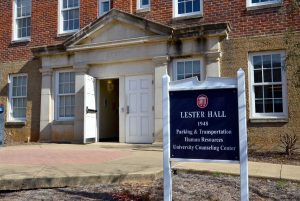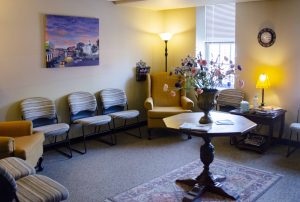Bud Edwards attempted to ease students’ concerns about the University Counseling Center’s new restrictive policy Tuesday night at a forum sponsored by Active Minds.

The Counseling Center is located on the third floor of Lester Hall. Photo by Tucker Robbins
The 10-session limit, which was announced over winter break, went into effect Jan. 2 and left students wondering why such a change would take place and if it would affect their mental health care while at Ole Miss.
“It’s kind of like going to the grocery store,” Edwards said. “If you’ve only got 50 bucks, and you put $55 worth of groceries in, you have to put something back.”
Despite the variety of services offered to students and faculty alike, which include emergency walk-in appointments through its triage service, Edwards said the UCC is not meant to be a primary treatment center for the most severe psychological stress, psychological disorders and conditions.
“If someone needs inpatient or an extensive outpatient program, we can’t provide that,” Edwards said. “Our facilities don’t allow for that.”
Miss Ole Miss Jessica Tran said she was glad students came to ask questions and get involved. After initially feeling uneasy about the limit, Tran said she was put at ease when Edwards explained the main goal of the limit is to provide a variety of services to more students rather than to limit overall access.
“I’m really hopeful to see where the university takes (the UCC) because the students are really powered up about these things,” Tran said.

Photo by Parker Galloway
Edwards said that, as of last semester, around eight percent of the student body used the UCC for counseling appointments. This number is slightly lower than the national average.
Of that eight percent of students who use the UCC, he said 40 percent visit one to three times, 45 percent visit between four and 15 times and the remaining 15 percent visit over 15 times, with the average number of visits per student falling between five and six.
“When you look at the percentages, that 10-session limit will not really affect most of the students who use our services,” Edwards said.
One of the main concerns raised during the meeting was whether or not a student who requires more than 10 sessions will be left without resources once they reach 10 sessions.
Edwards said that wouldn’t happen.
He mentioned that if a counselor determines that a few additional appointments would prove beneficial for a student using the UCC, then those in need would be evaluated and granted or denied additional appointments on a case-by-case basis.
Edwards said that, since becoming the UCC director, his goal has been efficiency. He said the UCC is currently trying to add to their offered services and become more effective as a whole.
Students and faculty in attendance agreed that expanding the number of staff members, renovating facilities and adding a master’s internship program, in addition to the current doctorate internship program, will allow more students to take advantage of the services they provide.

The Counseling Center is located on the third floor of Lester Hall. Photo by Tucker Robbins
While the number of private counseling appointments has been limited, Edwards mentioned that various free group counseling meetings have no attendance limit. These include skill-building groups, anxiety and depression management groups and substance abuse support groups.






